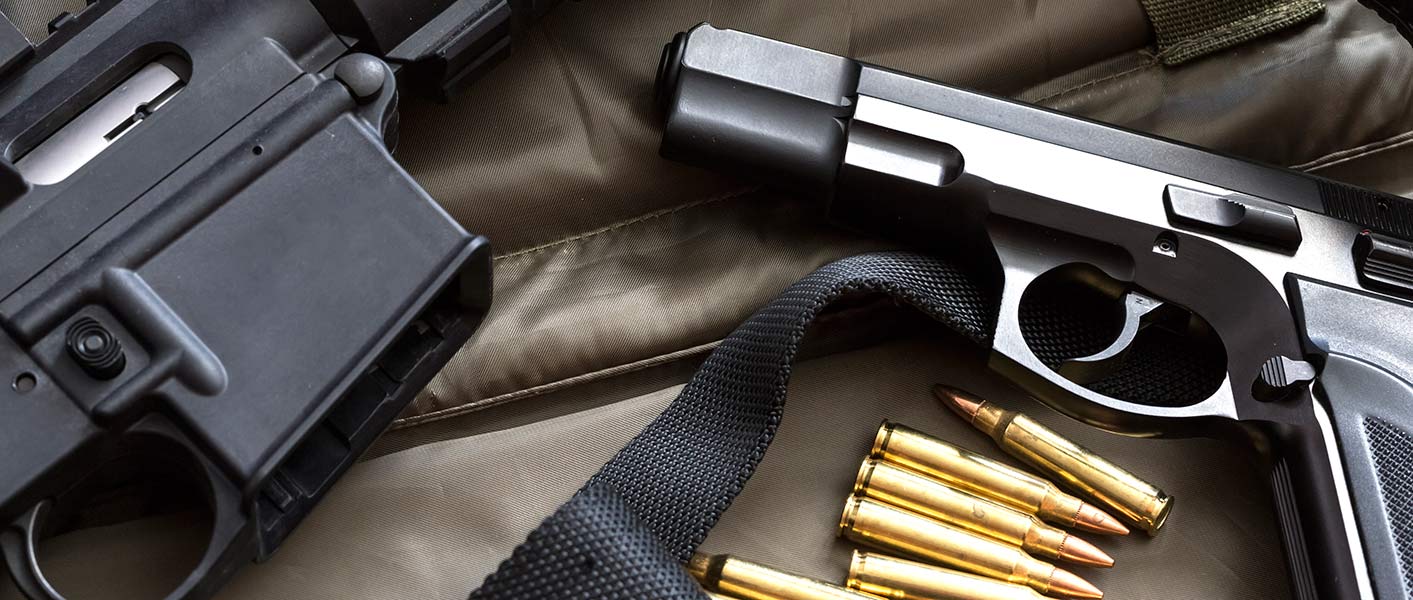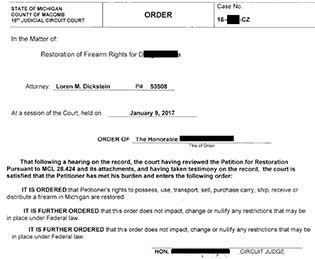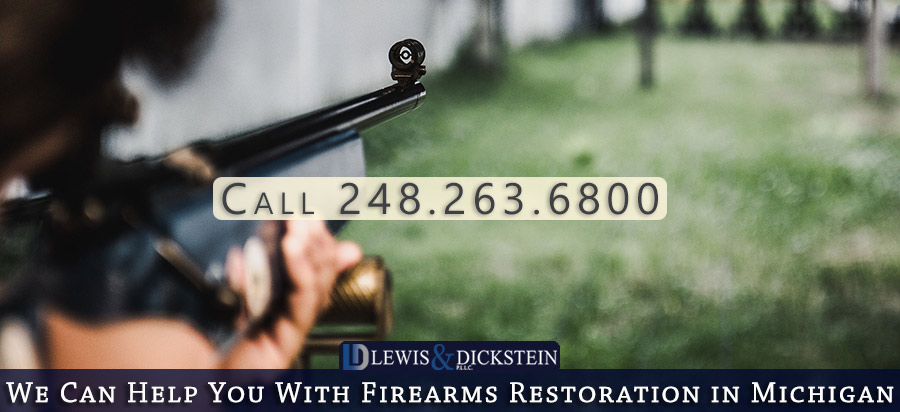Michigan Gun Rights Restoration
There is a lot at stake, and you should have legal help to restore your rights. The restoration of your firearm rights begins here.

We Are Dedicated to Helping Those Who Choose to Bear Firearms Do So Legally Under Michigan Law
Michigan’s gun rights restoration application process changed substantially in December 2015. Before that date, each Michigan county had a gun board comprised of local law enforcement (generally someone from the county sheriff’s office), the prosecutor’s office, and the Michigan State Police. These gun boards heard all gun-related matters in Michigan. An appeal to the court system was necessary if the petitioner was unsatisfied with the Gun Board’s decision. Now, gun boards have been disbanded. A person who has lost their firearm rights and wishes to have their right to possess, use, transport, sell, purchase, carry, ship, and receive a firearm restored, must apply to the circuit court in the county where they live for the restoration of those rights.
A person must wait 3 or 5 years to file their petition, depending on whether the felony that caused the loss of gun rights is a specified or a non-specified felony. A person with a specified felony must also have done the following:
- Paid all fines imposed for the violation.
- Served all terms of imprisonment imposed for the violation.
- Successfully completed probation or parole.
- Show that their record and reputation are such that they are unlikely to act in a manner dangerous to other people’s safety.
The gun rights restoration procedure changed to streamline applications. Legislators felt that resorting to a gun board slowed the process and that some applications were wrongfully denied.
Some attorneys have been routinely successful in seeking restoration through the court process.
It is important to note that a person can only file a petition for gun rights restoration once per year. So, doing it right the first time is crucial. A loss or adverse ruling by a judge can be tough to reverse with a subsequent petition, which is why qualified legal help is paramount.
No Federal Gun Rights Restoration Following a Michigan Felony Conviction
Even with a complete restoration of gun rights in Michigan, a person with a felony conviction is still prohibited from possessing firearms under Federal law (with certain minimal exceptions). Federal courts have ruled that unless a person’s civil rights are completely restored in the state, the federal government may still prosecute a defendant for possessing a firearm. For example, in Michigan, a person with a felony conviction cannot sit on a jury. Serving jury duty is a civil right. Under federal law, a person with a prior felony conviction can still be federally prosecuted as a felon in possession of a firearm because Michigan does not fully restore all of their civil rights. For example, the civil right to sit on a jury is not restored for a felony because a Michigan judge restored their firearm rights. A person with state-level restoration cannot purchase a gun from a Federal Firearms Licensee (FFL), including almost any store that carries firearms, or register a gun because the federal government does not recognize a Michigan restoration of firearms rights.
Regarding pistols, Michigan state law requires licensing for ALL handguns (defined as any firearm under 26 inches in overall length). The applicant must pass state and federal criminal record checks to get a license through the FBI’s National Instant Criminal Background Check System (NICS). Even after a successful firearms rights restoration, a person cannot pass a federal background check through NICS with a prior felony conviction in Michigan. The bottom line is that a Michigan felon cannot be licensed to purchase, carry, possess, or transport a firearm under 26 inches long and thus may not legally do so.
What about a firearm that is 26 inches in length or longer, like a rifle or shotgun? A Federal Firearms Licensee (FFL) will run a federal background check before selling a long gun in Michigan. The FFL will refuse to sell to anyone with a Michigan felony conviction, regardless of whether their firearm rights were restored. A background check is not required for someone to obtain a long gun through a private sale, gift, or inheritance. Under Michigan law (only), a person whose rights have been restored can legally purchase, carry, possess, or transport a long gun. Under federal law, a person whose rights have been restored in Michigan can still be prosecuted in federal court as a felon in possession of a firearm or ammunition.
Full Federal and State Restoration of Firearms Rights
Recently, Michigan’s expungement laws were overhauled. Under the Clean Slate laws, up to three felony convictions and unlimited misdemeanors can be set aside. If a conviction is set aside, otherwise known as expunged, that prior conviction might no longer serve as a federal bar to firearm rights. As of 2021, the Federal Bureau of Investigations (FBI) believes that Michigan’s expungement law is insufficient under national criteria. Federal courts haven’t yet decided whether an expungement under Michigan law is sufficient to remove a federal firearm’s right disability. If you seek restoration of your firearm rights, call us for a free consultation. We can determine if an expungement might be best for you. Our highly experienced expungement attorneys have decades of experience and an unparalleled track record of successfully achieving felony and misdemeanor expungements.
Michigan Gun Rights Restoration Application Attorneys — We Can Help You Get Your Gun Rights Restored.
Drafting a persuasive Michigan gun rights restoration application is integral to our practice at LEWIS & DICKSTEIN, P.L.L.C. We believe that after a person has served their punishment for an offense and the appropriate time has passed, they should be given a second chance. A second chance should include restoring all rights they lost as convicted felons (the right to vote, serve on a jury, etc.), not just firearms rights. The attorneys at LEWIS & DICKSTEIN, P.L.L.C. have successfully restored our client’s Michigan gun rights. We would happily review your situation and determine the proper way to proceed. The attorneys of LEWIS & DICKSTEIN, P.L.L.C. specialize in protecting the rights of people charged with criminal offenses, protecting people who have had their probation or parole violated, and ensuring that every person’s rights are protected. We take great pride in this.

Does Removal of a Felony Conviction Expungement Help?
Under certain circumstances, a judge can set aside a felony conviction through expungement. An expungement does not result in the federal restoration of firearms rights.
Although judges are frequently reluctant to set aside a felony conviction through an expungement, the lawyers with LEWIS & DICKSTEIN, P.L.L.C. have achieved unparalleled success clearing felony convictions from our client’s records. You might qualify for a felony expungement in Michigan after 3 to 7 years following your release from jail or probation, whichever was later. The expungement process and eligibility are governed under multiple statutes, collectively called the “clean slate” legislation. An individual’s eligibility for expungement is determined based on the number of felony and misdemeanor convictions and the types of offenses. Unfortunately, even if a judge grants your expungement, your federal firearms rights are not restored. If you have questions about your expungement eligibility or want the assistance of a lawyer with vast experience and a track record of winning, call LEWIS & DICKSTEIN, P.L.L.C. for a free consultation.
If you do not qualify for expungement because you have more than three felony convictions, you may still have options. If an attorney can find a way to clear your record of convictions that make you ineligible for an expungement, you may become eligible. For example, if you have four felony convictions and one is dismissed or removed, you may become eligible.
Effect of a Pardon on Firearm’s Rights Restoration
The Firearms Rights Restoration Team with LEWIS & DICKSTEIN, P.L.L.C. can file a Request for a Pardon from the Governor of Michigan, otherwise known as Executive Clemency. State and federal firearms rights are restored if the governor removes a felony through executive power.

Attorney Fees Gun Rights Restoration
Every case is different, and attorney fees can vary from case to case. As a general guideline, LEWIS & DICKSTEIN, P.L.L.C. requires a retainer of $3,500.00 to $5,000.00 on a gun rights restoration case. If this amount is within your budget, reach out to us for a free consultation, and we will try to find a way to help you. Every case is different; some firearm rights restoration cases might require an additional retainer.
Call us today at (248) 263-6800 for a free consultation or complete an online Request for Assistance Form. We will contact you promptly and find a way to help you.













